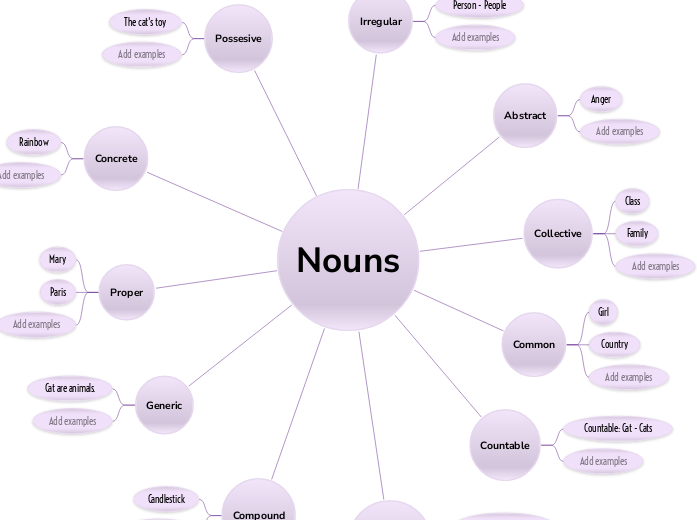Nouns Template
Use this mind map to become familiar with the different types of nouns! Learn how to identify them in a sentence.
Keywords: grammar, language


Honelako gehiago
Use this mind map template to learn nouns in English. Learn about their different types and how to identify them in a sentence. They can be irregular nouns, abstract nouns, collective nouns, common nouns, countable/uncountable nouns, compound nouns, generic nouns, proper nouns, concrete nouns, and possessive nouns.
A noun is a word that functions as the name of some specific thing or set of things, such as living creatures, objects, places, actions, qualities, states of existence, or ideas.
Compound nouns are words where two nouns have been stuck together to make a new noun. Compound nouns should be written as one word, without a hyphen.
Generic nouns are nouns that are part of a generic statement. Generic nouns can be singular or plural. The opposite of generic nouns is collective nouns.
The difference between definite/indefinite and generic nouns is that in the sentence there must be a blanket statement or question.
Proper nouns are the names of specific people or places. They should always begin with a capital letter.
A concrete noun is a noun that can be identified through one of the five senses (taste, touch, sight, hearing, smell).
Possessive nouns are nouns which possess something, normally another noun.
Countable nouns are nouns that can be counted, even if the number might be extraordinarily high.
Uncountable nouns are nouns that come in a state or quantity which is impossible to count; liquids are uncountable, as are things which act
like liquids.
Common nouns are words for people, places or things that aren’t specific (as opposed to a proper noun which refers to only one person, place or thing).
Common nouns can be countable or uncountable, singular or plural.
A noun which refers to a group of things/people.
A noun which cannot be identified by using one of the five senses (taste, touch, sight, hearing, smell).
Irregular nouns are nouns which don’t follow a spelling pattern when pluralized.
Buru-mapenek ideiak egiten laguntzen dute, kontzeptuen arteko harremanak ezartzen, ideiak antolatzen eta sortzen.
Hala ere, buru-mapen txantiloiak hasteko modu errazagoa eskaintzen dute, irakasgai zehatz bati buruzko informazioa duten markoak baitira jarraibide orientatzaileak. Funtsean, buru-mapen txantiloiak irakasgai zehatz baten elementu guztiak batzen dituen egitura bermatzen du eta zure buru-mapa pertsonalerako abiapuntu gisa balio du. Gai jakin bati buruzko mapa mentala sortzeko irtenbide praktikoa emateko baliabideak dira, bai negozioetarako, bai hezkuntzarako.
Mindomok esfortzurik gabe funtzionatzeko eta pentsatzeko aukera ematen duten buru-mapen txantiloi adimendunak eskaintzen dizkizu.
Gai deskribatzaileak
Hondoko testua duten gaiak
Adar lehenetsia
Txantiloiaren datuak kentzea
Mindomoren negozio- edo hezkuntza-kontuetako buru-mapen txantiloietatik aukera dezakezu, edo zure buru-mapa txantiloiak sor ditzakezu hutsetik. Edozein buru-mapa adimen-mapa txantiloi-mapa bihur daiteke bere gaietako bati gida-ohar gehiago gehituz.